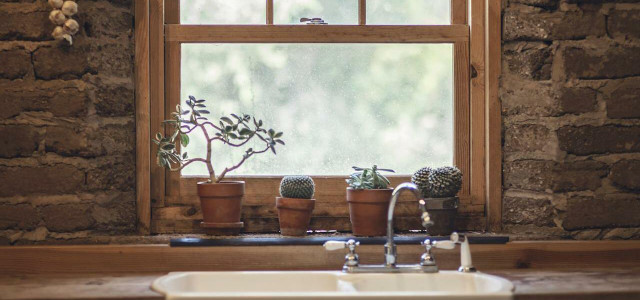Here's an easy, eco-friendly way to improve your air and sleep quality: simply choose between these best plants for the bedroom to transform how you feel overnight.
Ventilating your home is key to keeping indoor pollutants and bay, but when opening a window isn’t possible, we have to look to other methods. Air purifiers are expensive and use a lot of electricity to run throughout the day and night. There aren’t many times you really need such a loud, energy-sucking device sitting in your room. Houseplants can also provide air-purifying effects — and you don’t need to plug them in.
Houseplants take in carbon dioxide from the air and pump out fresh oxygen; much the same way trees work to de-pollute the atmosphere. Below, we list some of the best plants to purify air and dispose of breathable toxins. These are frequently the best plants for bedrooms, letting you sleep and breathe a little easier.
1. Snake Plants
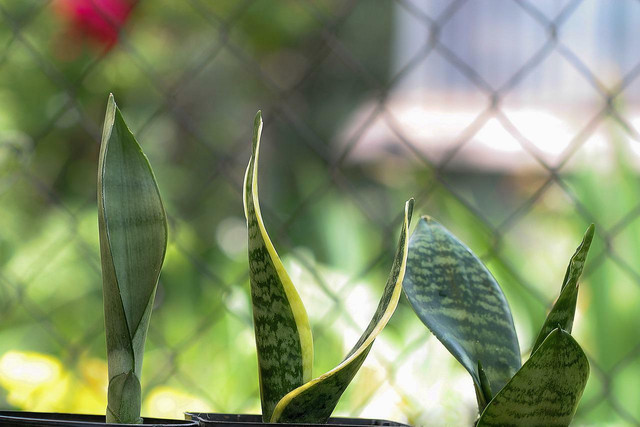
(Foto: CC0 / Pixabay / Olena758)
The snake plant — also called mother-in-law’s tongue or Dracaena trifasciata — is a green, thick-leafed succulent that can grow quite tall depending on the variety. It is a powerful natural air purifier and one of the few plants that convert carbon dioxide into oxygen at night — it’s actually one of our best plants for dark rooms, too.
Besides removing carbon dioxide, the snake plant also filters pollutants such as benzene, xylene, toluene and others, making it one of the best plants for bedrooms and helping us sleep.
Due to its lush, dark green leaves, sometimes people don’t realize the snake plant is a succulent and doesn’t need much water at all. Check out how to tell and what to do when you’ve accidentally overwatered a snake plant.
If you’re missing a plant pot to put the snake plant in: it is also one of the best plants to grow in a jar.
2. Peace Lilies
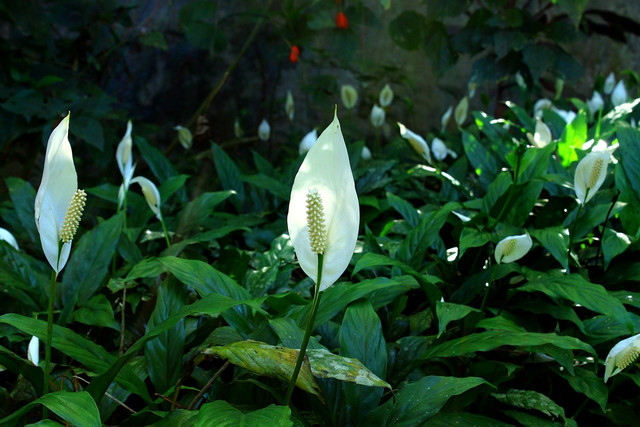


(Foto: CC0 / Pixabay / Gadini)
The peace lily, or Spathiphyllum, is a leafy plant with beautiful white flowers. Not only its decorative looks makes it one of the best plants for any bedroom. Depending on its surroundings, it can stay small or grow to fill large pots, which is when you need to know how to go about repotting a peace lily.
Peace lilies make a great way to naturally increase the humidity in your room, as they love moist soil and produce precipitation from their leaf tips, adding moisture to the air. In turn, this helps suppress air-born microbes, which can cause allergies. This makes it a great plant for your bedroom, especially in dryer climates as it’ll prevent your air from drying out and in turn improve your quality of sleep.
3. Pothos
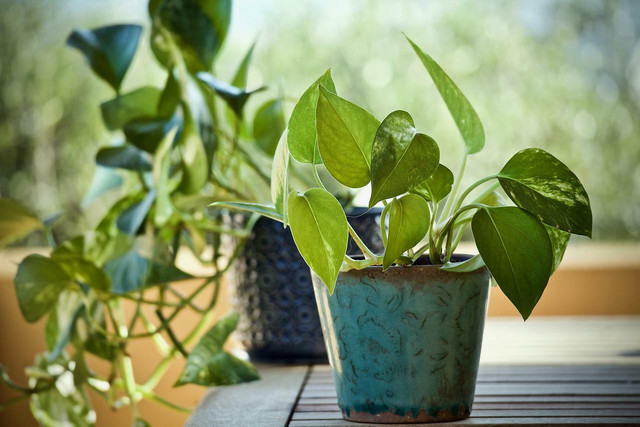


(Foto: CC0 / Pixabay / sweetlouise)
Pothos plants, also called devil’s ivy or golden pothos, can come in many shapes and sizes, but all give the same benefits. Its scientific name is Epipremnum aureum and this plant grows at a quick speed — so make sure you know how to repot a pothos plant. It likes to be in hanging pots, or be kept at a height so it can let its green leaves trail: a perfect plant to hang off one of your bedroom shelves.
Pothos has large green leaves that help to filter out air toxins like carbon dioxide and formaldehyde, which helps create a cleaner and safer environment for sleep. It has been named one of the best houseplants to help do so, meaning you can rely on this green friend to do the job properly.
To make sure it can keep helping you sleep better long term, be sure you keep an eye out on whether you overwatered your pothos.
4. Spider Plant



(Foto: CC0 / Pixabay / zoosnow)
The spider plant, also known as the ribbon plant is a common houseplant by the scientific name Chlorophytum comosum. It’s another fast grower (check out our step-by-step guide for repotting spider plants) and likes to be in high places so it can trail its bright green ribbons around.
They’re non-toxic, adaptable and easy-to-care-for and also make great kitchen plants.
Its similar air purifying properties to the snake plant and actually can absorb odors, giving you a simpler night’s sleep. They were named one of the best plants to clean air by NASA’s clean air study.
5. Lavender
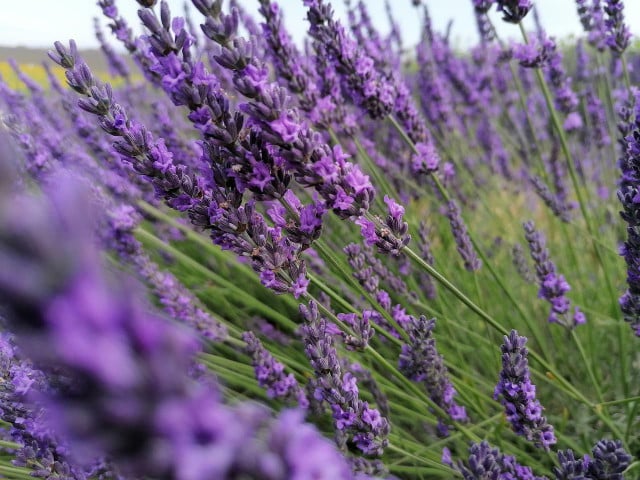


(Foto: CC0 / Pixabay / freddieragaas)
Lavender is well known for its scented herbal remedy and as well as being a great outdoor plant, you can keep a pot of lavender in your bedroom too. This purple flower gives off a calming scent that stimulates our production of melatonin, helping us sleep — which is why it is also one of the most well-known herbs for sleep.
Having one of these plants in your bedroom will not only help keep the scent of your bedroom calm, but it’ll also in turn help you get to sleep quicker through these aromatherapeutic properties.
Which Plants Not to Keep in the Bedroom
It can be tempting to fill your bedroom with any and every kind of houseplant, but there are some that will thrive much better in other areas of your home instead, like the bathroom. While there aren’t any plants that you can’t keep in your bedroom under any circumstances, some might be better suited to other rooms of the house for several reasons:
- Plants that are receptive to pests: common pests in houseplants include the common whitefly, aphids or red spider mites. As you mostly won’t get rid of any of these pesty insects within a day, you might feel uncomfortable sleeping in your bedroom knowing they are crawling or flying about. Of course, you can best avoid even the most common pests by taking good care of your houseplants overall.
- Trees tend to take up too much time, which might make you feel uncomfortable in your bedroom after all.
- Cacti or other plants with thorns or sharp edges might give you an unpleasant, spikey surprise when you’re stumbling out of bed half-awake at night or in the morning.
The list is seemingly endless when it comes to houseplants, so picking leafy plants that suit your individual style and needs is the best way forward. Having plants in your space can have a positive impact on your mental health too, there are so many benefits of our green friends.
Read more:
- 10 Plants That Repel Insects Naturally
- Best Indoor Hanging Plants to Decorate Your Home
- How to Get Rid of Drain Flies: 3 Natural Methods
Important Information regarding Health-related Topics.
** Links to retailers marked with ** or underlined orange are partially partner links: If you buy here, you actively support Utopia.org, because we will receive a small part of the sales proceeds. More info.Do you like this post?






